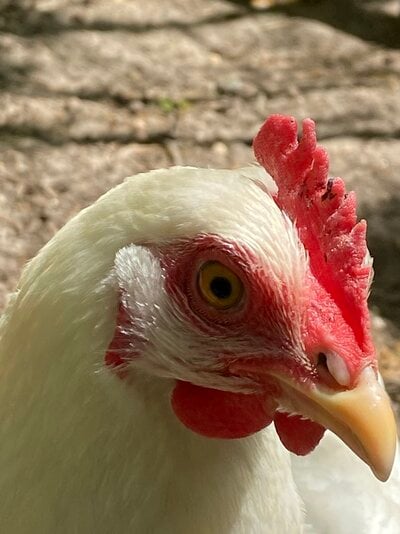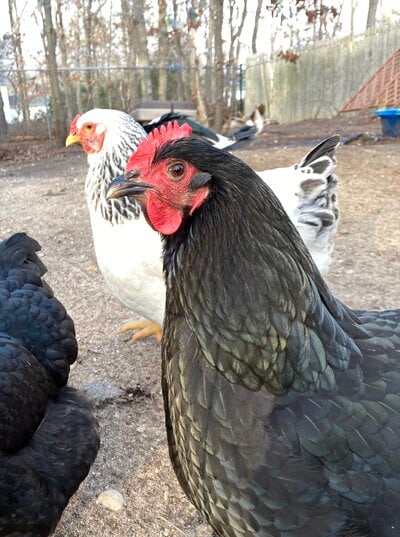As anyone who’s cared for chickens knows, chickens are sensitive animals, keenly attuned to dangers and changes in their environments. Those of us who spend time enjoying observing our flocks may also notice some special individuals who stand out, and are identifiable by their own unique personality traits. This individuality is just one of the great things about keeping chickens, and is a topic that comes up often on the boards.
(Check out these links to see what I’m talking about:
https://www.backyardchickens.com/th...d-and-best-personality.1342770/#post-22034209
https://www.backyardchickens.com/threads/breeder-for-personality.1468588/#post-24464947
https://www.backyardchickens.com/th...ilarious-personalities.1500601/#post-25083734.)
While many chicken keepers love to talk about our birds’ personalities (and, in some cases, their lack thereof), we don’t always stop to consider just how clever or even downright intelligent they are. This is a question that has long interested me and I’m especially interested in the ways that chickens communicate. Recently I decided to do some investigating, and it did not take long to find a solid body of research to support what I had suspected all along: chickens are not only personable and fun but are also excellent communicators and quite intelligent!
I began my research by searching for reliable scientifically based studies examining the intellectual capacity and communication skills of chickens. These are qualities that can be evaluated and measured in various ways, including by considering how chickens keep order within their flocks, share information, and solve problems. There were numerous interesting studies, and I've linked some good ones at the end of this article. (You can also check out a wide range of other BYC posts about this topic at: https://www.backyardchickens.com/threadloom/search?keywords=how+smart+are+chickens&tab=0)
Dr. Lori Marino, a professor and scientist, conducted and published a detailed study about chicken intelligence in 2017. This study provided a good starting point for my research. Marino’s “overall conclusion is that chickens are just as cognitively, emotionally and socially complex as most other birds and mammals in many areas […]”[1] Or, in simpler terms, as Science Daily reported in their “Science News” section, “Chickens are not as clueless or ‘bird-brained’ as people believe them to be.”[2]
Support for this conclusion is found in various aspects of chicken behavior. Probably the most familiar flock-based behavior of chickens is the “pecking order.” This is not necessarily an indicator of intelligence or good communication in and of itself, but it does point to the ability of chickens to establish, enforce, and remember a social hierarchy. The concept of the pecking order emerged in the 1920s and is credited to a Norwegian biologist named Thorleif Schjelderup-Ebbe. From here, other researchers went on to identify more interesting facts about the complex communication systems of chickens. It turns out that chickens can make more than twenty distinct sounds, each used differently in different situations to convey specific information or a unique message (at least to other chickens).[3] The way this works is complicated. The sounds were first identified in the 1920s, but it was not until the 1990s that they could be studied and codified in more detail, thanks to the assistance of technology. The movement-based communication of chickens may be even more complex than their vocal communication. Virtually anyone whose flock includes a rooster is probably familiar with both not only with their “cock-a-doodle-do” but also the practice of “tidbitting” – which is basically a song and dance that roosters do to announce and celebrate their discovery of food to the rest of the flock.
In recent years, research techniques have improved to allow scientists to move beyond these observations to study the general behavior, movements, and communication of chickens in greater detail. Recently Australian researchers utilized multi-camera systems to record and observe the movements and sounds of chickens over an extended period. In doing so, they found distinctly identifiable behaviors used by roosters, hens, and chicks to communicate several different messages.
Chickens also demonstrate what scientists describe as "the capacity for self-control" or patience, which was measured by giving chickens a small reward (brief access to food) for waiting two seconds to peck at something and a larger reward (longer access to food) for waiting six seconds.[4] In this experiment, chickens waited the six seconds to that they would receive the better reward. They also found that mother hens can empathize with their chicks by displaying their own distress when their babies are stressed as well as making extra clucking sounds to the chicks, seemingly intended to sooth or reassure the babies, while the babies are enduring stressful, but otherwise harmless, conditions.[5] Chicks also have impressive intellectual abilities of their own. For example, a 2009 study found that chicks as young as three and four days old can distinguish between quantities of more or less objects when tasked with choosing the larger sample.[6] As if this isn’t impressive enough, researchers studying chickens also cite numerous examples of chickens who “outwit” conditions of testing and use complex communication within their flocks to outwit one another in order to gain some advantage.
The evidence for chickens’ intelligence is impressive. Rather than continue on though, I’ll stop here and just encourage readers to keep all of this in mind the next time you’re spending a little time with your flock and remember, your birds may be a little (or a lot) smarter than you previously gave them credit for.
[1] Marino, L. Thinking chickens: a review of cognition, emotion, and behavior in the domestic chicken. Anim Cogn 20, 127–147 (2017). https://doi.org/10.1007/s10071-016-1064-4
[2] Springer. "Think chicken: Think intelligent, caring and complex: Review looks at studies on chicken intelligence, social development and emotions." ScienceDaily. ScienceDaily, 3 January 2017. <www.sciencedaily.com/releases/2017/01/170103091955.htm>
[3] The details of this research are explored in Scientific American, "Brainy Bird" in SA Special Editions 26, 2s, 46-51 (May 2017) doi:10.1038/scientificamericansecretlivesofanimals0517-46
[4] Abeyesinghe SM, Nicol CJ, Hartnell SJ, Wathes CM. Can domestic fowl, Gallus gallus domesticus, show self-control? Anim Behav. 2005;70:1–11. doi: 10.1016/j.anbehav.2004.10.011. [CrossRef] [Google Scholar] Referenced in Marino.
[5] The harmless condition tested was a puff of air being blown onto the chicks, while the mother hens watched.
[6] Rugani, Rosa, Laura Fontonari, Eleonora Simoni, Lucia Regolin, and Giorgio Vallortigara, “Arithmetic in Newborn Chicks.” Proc. R. Soc. B.2762451–2460 (April 2009) http://doi.org/10.1098/rspb.2009.0044
(Check out these links to see what I’m talking about:
https://www.backyardchickens.com/th...d-and-best-personality.1342770/#post-22034209
https://www.backyardchickens.com/threads/breeder-for-personality.1468588/#post-24464947
https://www.backyardchickens.com/th...ilarious-personalities.1500601/#post-25083734.)
While many chicken keepers love to talk about our birds’ personalities (and, in some cases, their lack thereof), we don’t always stop to consider just how clever or even downright intelligent they are. This is a question that has long interested me and I’m especially interested in the ways that chickens communicate. Recently I decided to do some investigating, and it did not take long to find a solid body of research to support what I had suspected all along: chickens are not only personable and fun but are also excellent communicators and quite intelligent!
I began my research by searching for reliable scientifically based studies examining the intellectual capacity and communication skills of chickens. These are qualities that can be evaluated and measured in various ways, including by considering how chickens keep order within their flocks, share information, and solve problems. There were numerous interesting studies, and I've linked some good ones at the end of this article. (You can also check out a wide range of other BYC posts about this topic at: https://www.backyardchickens.com/threadloom/search?keywords=how+smart+are+chickens&tab=0)
Dr. Lori Marino, a professor and scientist, conducted and published a detailed study about chicken intelligence in 2017. This study provided a good starting point for my research. Marino’s “overall conclusion is that chickens are just as cognitively, emotionally and socially complex as most other birds and mammals in many areas […]”[1] Or, in simpler terms, as Science Daily reported in their “Science News” section, “Chickens are not as clueless or ‘bird-brained’ as people believe them to be.”[2]
Support for this conclusion is found in various aspects of chicken behavior. Probably the most familiar flock-based behavior of chickens is the “pecking order.” This is not necessarily an indicator of intelligence or good communication in and of itself, but it does point to the ability of chickens to establish, enforce, and remember a social hierarchy. The concept of the pecking order emerged in the 1920s and is credited to a Norwegian biologist named Thorleif Schjelderup-Ebbe. From here, other researchers went on to identify more interesting facts about the complex communication systems of chickens. It turns out that chickens can make more than twenty distinct sounds, each used differently in different situations to convey specific information or a unique message (at least to other chickens).[3] The way this works is complicated. The sounds were first identified in the 1920s, but it was not until the 1990s that they could be studied and codified in more detail, thanks to the assistance of technology. The movement-based communication of chickens may be even more complex than their vocal communication. Virtually anyone whose flock includes a rooster is probably familiar with both not only with their “cock-a-doodle-do” but also the practice of “tidbitting” – which is basically a song and dance that roosters do to announce and celebrate their discovery of food to the rest of the flock.
In recent years, research techniques have improved to allow scientists to move beyond these observations to study the general behavior, movements, and communication of chickens in greater detail. Recently Australian researchers utilized multi-camera systems to record and observe the movements and sounds of chickens over an extended period. In doing so, they found distinctly identifiable behaviors used by roosters, hens, and chicks to communicate several different messages.
Chickens also demonstrate what scientists describe as "the capacity for self-control" or patience, which was measured by giving chickens a small reward (brief access to food) for waiting two seconds to peck at something and a larger reward (longer access to food) for waiting six seconds.[4] In this experiment, chickens waited the six seconds to that they would receive the better reward. They also found that mother hens can empathize with their chicks by displaying their own distress when their babies are stressed as well as making extra clucking sounds to the chicks, seemingly intended to sooth or reassure the babies, while the babies are enduring stressful, but otherwise harmless, conditions.[5] Chicks also have impressive intellectual abilities of their own. For example, a 2009 study found that chicks as young as three and four days old can distinguish between quantities of more or less objects when tasked with choosing the larger sample.[6] As if this isn’t impressive enough, researchers studying chickens also cite numerous examples of chickens who “outwit” conditions of testing and use complex communication within their flocks to outwit one another in order to gain some advantage.
The evidence for chickens’ intelligence is impressive. Rather than continue on though, I’ll stop here and just encourage readers to keep all of this in mind the next time you’re spending a little time with your flock and remember, your birds may be a little (or a lot) smarter than you previously gave them credit for.
[1] Marino, L. Thinking chickens: a review of cognition, emotion, and behavior in the domestic chicken. Anim Cogn 20, 127–147 (2017). https://doi.org/10.1007/s10071-016-1064-4
[2] Springer. "Think chicken: Think intelligent, caring and complex: Review looks at studies on chicken intelligence, social development and emotions." ScienceDaily. ScienceDaily, 3 January 2017. <www.sciencedaily.com/releases/2017/01/170103091955.htm>
[3] The details of this research are explored in Scientific American, "Brainy Bird" in SA Special Editions 26, 2s, 46-51 (May 2017) doi:10.1038/scientificamericansecretlivesofanimals0517-46
[4] Abeyesinghe SM, Nicol CJ, Hartnell SJ, Wathes CM. Can domestic fowl, Gallus gallus domesticus, show self-control? Anim Behav. 2005;70:1–11. doi: 10.1016/j.anbehav.2004.10.011. [CrossRef] [Google Scholar] Referenced in Marino.
[5] The harmless condition tested was a puff of air being blown onto the chicks, while the mother hens watched.
[6] Rugani, Rosa, Laura Fontonari, Eleonora Simoni, Lucia Regolin, and Giorgio Vallortigara, “Arithmetic in Newborn Chicks.” Proc. R. Soc. B.2762451–2460 (April 2009) http://doi.org/10.1098/rspb.2009.0044


